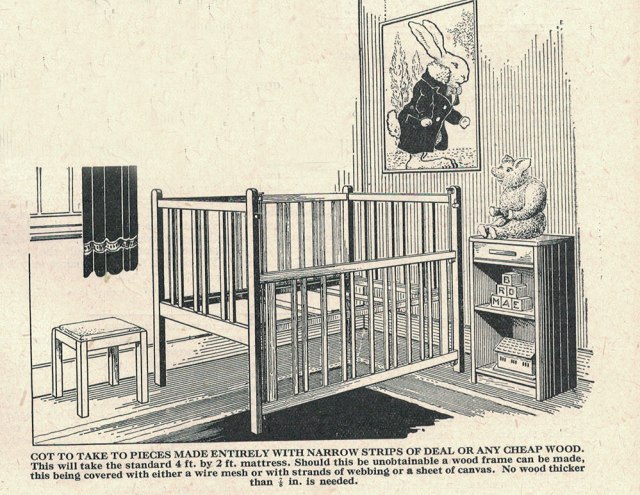
“ … For the comfort and seemliness of our furniture will decide the background of our home; whether it is to be a place we can truly rejoice in and be proud of, or whether it is to be a shoddy sort of place, a mean, vulgar sort of place. And these things do not depend upon whether a man is rich or poor. A rich man’s house can be innately vulgar, and a poor man’s house have real charm. It all depends upon what we are trying to do and how we set about doing it.
It is all part of the last defence, which is honesty of workmanship and purpose, qualities that were by no means the hallmark of the mass-produced furniture that flooded the market before the war, much of which had for its only purpose to tempt people to buy meretricious stuff which they did not really need and to push good, honest workmanship into the background. The man who has sufficient skill to make his own furniture need never succumb to this kind of temptation. For he at least knows how things ought to be done, he understands good construction and should have a keen eye for all the paltry makeshifts by which weaknesses and defects are hidden in the shoddy article. It is one of the evils of our time that so many men do not know how things are done. The nature of their work has been divorced from making; and it is from making, something, anything, soundly and well, that we get our main training of eye as well as hand.
Allied with this last defence comes beauty a shy quality in which good taste must combine with good workmanship and which even then refuses to be exactly defined. So many things in the home contribute to it; comfort, order, colour, charm, all reflecting something of the personality of the man and woman about whom the home centres, so that in thinking of “home” we think of a unity into which all are gathered—father, mother, children, background. And beauty becomes the first defence of the home as well as the last when it helps to keep boys or girls poised and steady when they are away from it, seeing it with new eyes just because they are away and are no longer blinded by familiarity, and giving them a standard by which to judge the outer world. The man who is honest with himself, honest with his work, and anxious to make good, honest things, is laying the foundation of such a standard. And beauty will not be far behind, indeed must follow, if he will put the best of his mind and will to it:
‘ … look where our dizziest spires are saying
What the hands of a man did up in the sky;
Drenched before you have heard the thunder,
White before you have felt the snow;
For the giants lift up their hands to wonder
How high the hands of a man could go.’ ”
—Charles Hayward, The Woodworker magazine, 1942; the poem Hayward references at the end is by G. K. Chesterton, titled “For Four Guilds: III. The Stone-Masons,” from the book “The Ballad of St. Barbara: And Other Verses”